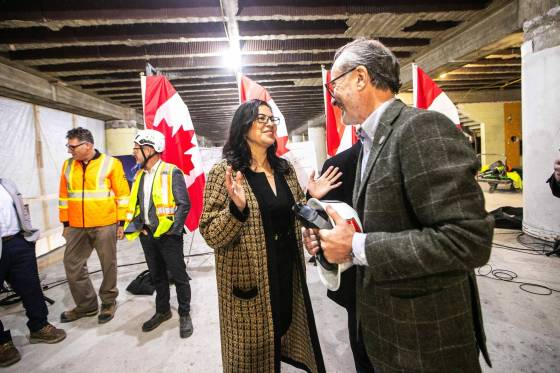FIVE STORIES ON TURTLE ISLAND
This week witnessed the opening ceremony and arguments of a potentially groundbreaking case at the Canadian Human Rights Tribunal against the Canadian federal government for its funding model for First Nations schools.
Legal counsel for the Mississaugas of the Credit First Nation is alleging Canada’s current educational funding model for on-reserve schools is “inadequate, racially discriminatory and perpetuates the colonial harms inflicted on children at residential schools.”
The case argues First Nations schools in Ontario are fundamentally different and face disadvantages and demands that go unaddressed and therefore result in wide gaps of educational attainment between on-reserve and Canadian students.
If successful, a CHRT ruling could be as revolutionary as the tribunal’s past decisions on child welfare on First Nations.
In Calgary this week, the BHP Foundation announced $16 million in funding to improve Indigenous-led entrepreneurship and business education across Canadian colleges and three Indigenous educational institutions.
The Mamawi initiative will encourage educational institutions to create opportunities for Indigenous learners to be trained, get mentorship and participate in research that can equip them in becoming entrepreneurs, to start ventures and create economic opportunities in communities.
Speaking of economic reconciliation, the University of Manitoba is hosting a discussion in a few weeks with local Indigenous business leaders on this very topic — check it out here.
Controversy is emerging about the way some convicted individuals in Canada use Gladue reports to falsely claim Indigenous identity in order to reduce or alter their sentences.
In 1999, Canada’s Supreme Court ruled that judges must take into consideration the influence of traumatizing events such as land and cultural loss, residential schools, the Sixties Scoop or experiences with the child-welfare system when sentencing Indigenous offenders.
For years now scholars, researchers and Indigenous leaders have been pointing out that some individuals are claiming Indigenous identity falsely by simply “self-identifying” without any legitimacy and that an “identity verification” system is needed.
There is enough evidence to suggest some nefarious Canadians are using Gladue principles to try to lighten their sentences and something must be done about it.
Speaking of people falsely claiming to be Indigenous for personal benefit, the House of Commons Indigenous and Northern Affairs committee has received a report calling for immediate legislation to stop non-Indigenous businesses from posing as “Indigenous businesses” and gain lucrative government contracts.
Last year a media and academic investigation revealed widespread concerns non-Indigenous companies were finding ways to circumvent lax verification rules to convince the government they were at least 51 per cent owned by Indigenous people.
This resulted in the removal of more than a thousand Canadian businesses from the federal registry, but there is much more work to do.
According to new research, the U.S. government shutdown is exposing deep flaws in how the United States federal government fulfils its economic commitments under treaties.
Native American communities are deeply feeling the impacts from the shutdown, and there are instances of corruption, harm and division emerging as a result.
This was all predictable and is solveable if people are put before profit, personal interests and politics.
The question is, will U.S. politicians — and in particular Republicans — care enough about people to do something about it?
IN PICTURES

Minister of Northern and Arctic Affairs and Minister Responsible for the Canadian Northern Economic Development Agency Rebecca Chartrand chats with Jim Ludlow, president of True North Real Estate Development, at the under-construction Wehwehneh Bahgahkinahgohn building earlier this month. (Mikaela MacKenzie / Free Press)
RECONCILI-ACTION OF THE WEEK
Every week I highlight an action, moment, or milestone forwarding reconciliation, illustrating how far Canada has come — and how far the country has yet to go.
This week’s reconciliaction of the week is the passing of Bill 210, the Indigenous Veterans Day Act, in the Manitoba legislature.
The act officially states Nov. 8 as the day in which all Manitobans will recognize the contributions and sacrifices of First Nation, Inuit, and Métis veterans and acknowledge the racism and prejudice they faced in order to promote reconciliation.
Since 1994, Nov. 8 was used by Indigenous veterans who have felt not included in Remembrance Day (Nov. 11) but now will be recognized in this province by all of us.
As the grandson of both a Canadian and an Indigenous veteran, I am happy to live in a place where both will be finally recognized for the incredible gifts they have given all of us in this country.
|

